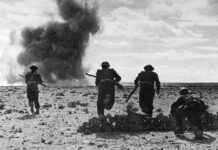Nearly six weeks after the death of Mahsa Amini, the protest movement continues across Iran despite a deadly crackdown and hundreds of arrests.
On Wednesday, an attack claimed by the jihadist group Islamic State (IS) killed 15 people in an important Shiite Muslim shrine in Shiraz, in the south of Iran.
President Raisi seemed to establish a link between the two, believing that the “riots” triggered by the death of Mahsa Amini opened the way to “terrorist” attacks.
The 22-year-old Iranian Kurd died on September 16, three days after she was arrested in Tehran by morality police who accused her of breaking the Islamic Republic’s strict dress code, imposing the wearing of the veil for women. women in the public space.
His death triggered a wave of protest on an unprecedented scale for three years in Iran. Like the students, young women and schoolgirls took to the front lines, many bareheaded, burning their veils and defying the security forces.
Iranian leaders mainly accuse the United States, Iran’s sworn enemy, of being behind these protests which they describe as “riots”.
– “Divide” the nation –
“The enemy’s intention is to disrupt the country’s progress, and these riots pave the way for terrorist acts,” Raisi said on Thursday during a visit to the northwestern city of Zanjan.
Mr. Raisi had already accused Wednesday “the enemies of Iran” who seek “to divide the united ranks of the nation (…) by violence and terror”, and promised a severe response from the security forces in reaction attack on Shiraz.
ISIS has already claimed responsibility for attacks in Iran since that of June 7, 2017, when armed men and suicide bombers attacked the Parliament and the mausoleum of the founder of the Islamic Republic, Ayatollah Khomeini, in Tehran, killing 17 people.
Iran’s Supreme Leader Ayatollah Ali Khamenei on Thursday called on the country to unite to fight the “plot” fomented by the “enemies of Iran”.
In this context, the demonstrations continued in the night then Thursday.
Security forces opened fire on Thursday in Mahabad, western Iran, killing a Kurdish protester as a crowd prepared to invade government offices, human rights group Hengaw said.
The incidents erupted after the burial of a 35-year-old protester, Ismail Mauludi, who was killed on Wednesday night as the crowd marched towards the governor’s offices, Hengaw added.
“We should not mourn our young people, we should avenge them,” protesters shouted, according to the Norway-based NGO, which defends the rights of Kurds in Iran.
– Nocturnal demonstrations –
During the night, explosions were heard when security forces opened fire on protesters in Marivan, a city in the western province of Kurdistan, according to a video published by Hengaw.
“Death to the dictator,” shouted protesters who had lit fires in the streets of the nearby town of Bukan, according to this group. Similar scenes were reported in Ilam, a city in western Iran near the border with Iraq.
Other protesters surrounded a Basij paramilitary militia base in Sanandaj, another Kurdistan town, setting fires and pushing back security forces, according to Hengaw.
Defying a heavy security device, shouting “Woman, life, freedom”, a crowd of several thousand men and women gathered on Wednesday around the tomb of Mahsa Amini in Saghez, his hometown in Kurdistan, for a tribute at the end of the traditional 40-day mourning.
“This year is the year of blood, Seyed Ali will be overthrown,” shouted a group on a video authenticated by AFP, in reference to the Iranian supreme leader.
After the rally, demonstrators moved towards the governor’s offices in the center of the city, where, according to Iranian media, some had intended to attack a military base.
According to Hengaw, security forces then fired tear gas and opened fire at protesters, but it was unclear whether those shots had caused any deaths or injuries.
The crackdown on protests triggered by the death of Mahsa Amini has left at least 141 people dead, including children, according to a report revealed on Tuesday by the NGO Iran Human Rights (IHR), based in Oslo.








